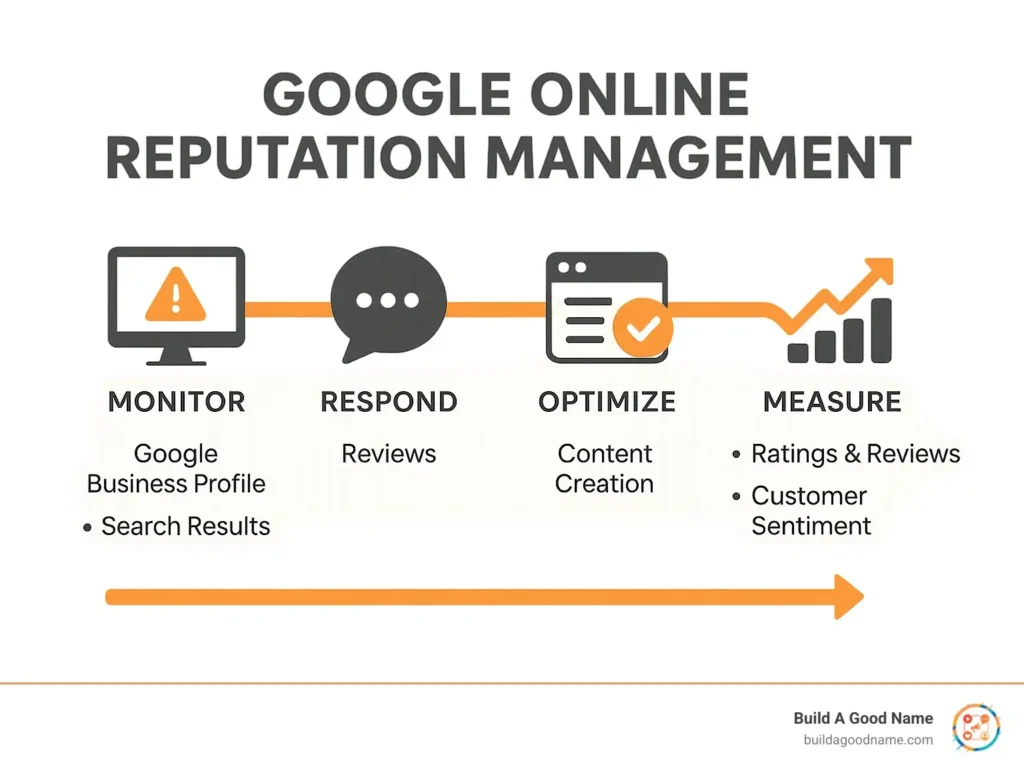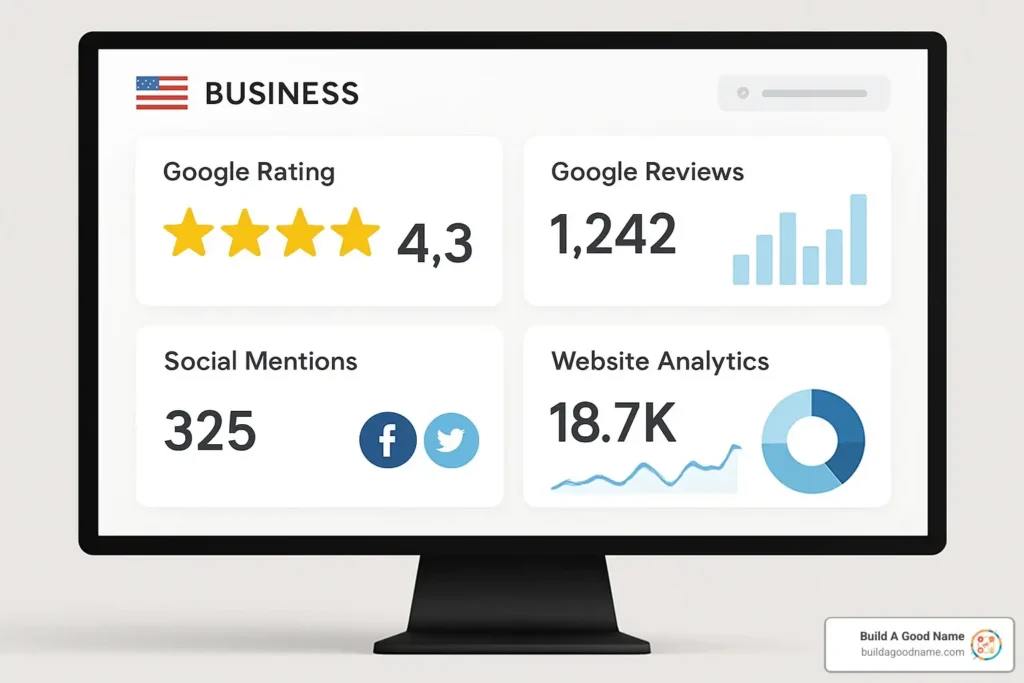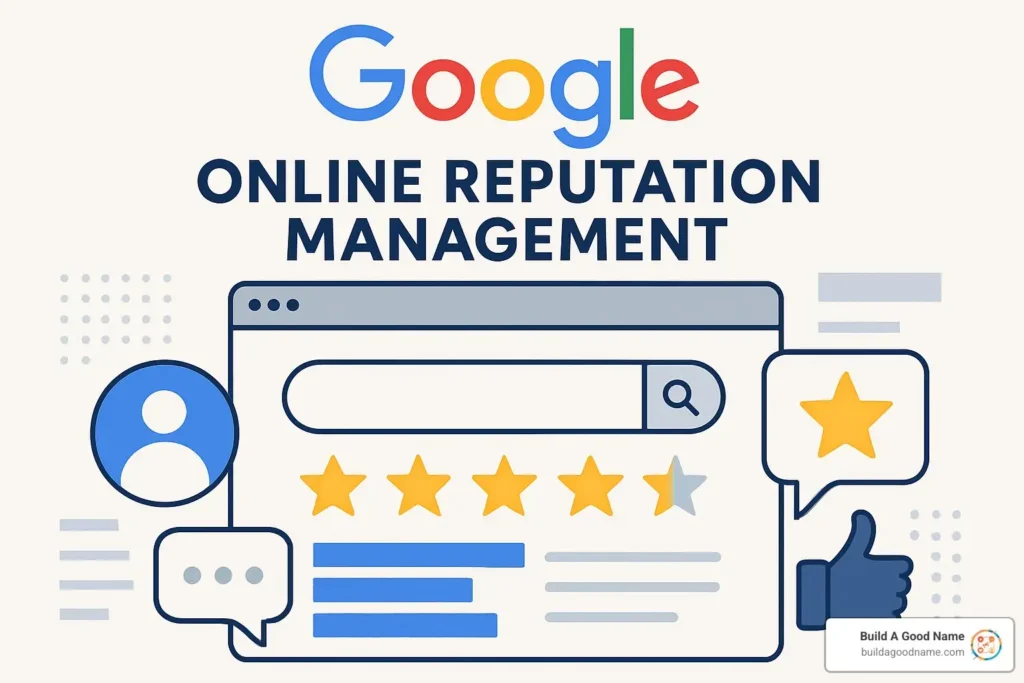Why Your Google Reputation Makes or Breaks Your Business
Google online reputation management is the process of monitoring, managing, and improving how your business appears in Google search results – from reviews and ratings to knowledge panels and search listings.
What Google Online Reputation Management Includes:
- Google Business Profile optimization – Complete listings with accurate info, photos, and regular updates
- Review monitoring and response – Tracking all customer feedback across Google platforms
- Search result management – Controlling what appears when people Google your business name
- Content creation – Publishing positive content to outrank negative results
- Performance tracking – Measuring star ratings, review volume, and customer sentiment
The stakes are high. Research shows that 94% of consumers avoid businesses after reading bad reviews, while businesses lose approximately 22% of potential customers when just one negative article appears on the first page of search results.
The good news: your Google reputation can be actively managed and improved. Businesses that maintain complete, optimized Google profiles see 70% more visits and 50% more purchase consideration.

Google Online Reputation Management 101
When potential customers Google your business name, they’re not shopping around anymore – they’re already interested and just want to verify you’re trustworthy before they contact you.
Traditional SEO helps strangers find you when searching “pizza delivery near me.” But Google online reputation management controls what happens when someone searches your actual business name like “Tony’s Pizza.”
Google’s top search result gets 34.2% of all clicks, while the second result drops to just 17.1%. This makes controlling those first few positions crucial for business success.
| SEO Focus | ORM Focus |
|---|---|
| Ranking for industry keywords | Controlling branded search results |
| Driving new traffic | Converting existing interest |
| Competing with all businesses | Managing your specific reputation |
| Generic content optimization | Personal brand narrative control |
How Google Shapes Perception through SERPs
Google now shows comprehensive business information beyond basic website links. Star ratings and reviews appear directly in search results, while knowledge panels display business details from Google’s database of over 500 million objects and 3.5 billion facts.
Google also pulls in conversations from Reddit, Facebook posts, and forum discussions about your business. Video content can appear in special carousels, taking up valuable visual space in search results.
The Main Components of Your Google Presence
Your Google Business Profile serves as your digital headquarters, including business information, photos, reviews, and Q&A sections. Complete profiles get 70% more visits than incomplete ones.
Organic search results should ideally show your official website first, followed by positive profiles from other platforms. Review platforms like Yelp and Facebook, social media profiles, news coverage, and video content all contribute to your overall search presence.
The key insight: Google pulls information from hundreds of sources to create your business’s digital story. Every review platform, social media mention, and online discussion becomes part of your reputation.
Monitoring & Measuring Your Reputation

Effective Google online reputation management starts with understanding exactly what customers see when they search for your business.
Start with a brand audit using an incognito browser to search your business name. Take screenshots of everything on the first page – your website, reviews, social profiles, and any negative content.
Key metrics include your average star rating across platforms, review velocity (new reviews per month), response rate to customer feedback, sentiment analysis of mentions, and SERP positioning of your owned content.
Google Alerts provides free basic monitoring, but Review Management Software offers comprehensive tracking with instant alerts across Google, Facebook, Yelp, and industry-specific sites.
Research shows 98% of consumers rely on online reviews when making purchasing decisions, while 69% disregard reviews older than three months. This means your reputation needs active, ongoing attention.
Tools & Metrics for Google Online Reputation Management
Professional monitoring goes beyond basic Google Alerts. Track your exact business name, common misspellings, key employee names, and industry keywords combined with your location.
Modern platforms use AI to analyze sentiment automatically, creating word clouds of common themes and unified “Rep Scores” combining multiple reputation factors.
Critical metrics include review response time (industry standard: under 24 hours), sentiment trend analysis, competitive benchmarking, and platform-specific performance.
Understanding Reputation Management and Your Digital Footprint helps connect these metrics to your broader digital marketing strategy.
When to Bring in Professional Help
Crisis scenarios like viral negative content, legal issues involving defamation, multiple negative articles on page one, or competitor attacks require professional expertise.
Operational signs include spending over 10 hours weekly on reputation management, direct sales impact from negative content, or managing multiple locations with inconsistent performance.
The decision often comes down to opportunity cost – if reputation management consumes resources better spent on core business activities, professional help becomes a smart investment.
Building & Optimizing a Positive Google Reputation

Smart businesses build fortress-like positive presences before problems arise. Your Google Business Profile becomes your digital storefront – complete profiles get 70% more visits than incomplete ones.
Key fundamentals include NAP consistency (Name, Address, Phone) across all platforms, professional photos, and regular posts about promotions and company news. Schema markup helps trigger rich search results with star ratings and business hours.
The goal is SERP domination – controlling multiple spots on Google’s first page through your website, social profiles, directory listings, and press releases.
For location-based businesses, Review Management for Local Businesses provides targeted strategies. Google’s Google Business Profile platform offers free optimization tools.
Encouraging Reviews for Better Google Online Reputation Management
The secret lies in peak moment strategy – asking for reviews when customer satisfaction hits its highest point. QR codes on receipts and shortened review links via text remove friction from the process.
In-person requests after delivering great service carry the most weight. Showcase positive reviews across marketing materials to extend their impact beyond the original platform.
Our Automated Review Replies system maintains personal touch at scale with AI-generated contextual responses.
Never offer rewards for reviews – this violates platform policies. Focus on delivering exceptional service that naturally motivates customers to share their experience.
Content & SEO Tactics for Google Online Reputation Management
When negative content appears, create better content that pushes problematic material off the first page. This content suppression strategy works because Google shows the most relevant, high-quality results first.
Blog posts addressing customer questions, press releases announcing achievements, and video content showcasing expertise all capture valuable search real estate.
Link building from industry publications and partner websites helps positive content rank higher. The suppression timeline typically requires 3-6 months of consistent effort, but creates permanent assets protecting your business from future reputation threats.
Responding & Repairing: Handling Positive and Negative Reviews

Every review response showcases who you are as a business to three audiences: the original reviewer, potential customers, and Google’s algorithm (which considers response rates for local search rankings).
88% of consumers would use a business that replies to all reviews, while only 47% would use a business that doesn’t respond. Speed matters – respond within 24-48 hours while maintaining quality over rushed replies.
Personalize each response by referencing specific details. Instead of “Thanks for the great review!” try “Thanks for mentioning how quickly Sarah helped you – she’ll be thrilled to hear this!”
Our Respond to Google Reviews guide covers specific scenarios. Always respond publicly first for transparency, then invite detailed conversations privately.
Best Practices for Positive Review Responses
Great positive responses thank the customer genuinely, reinforce key business messages, and encourage future loyalty simultaneously.
Start with specific gratitude showing you read their review. If they mentioned “lightning-fast delivery,” call that out specifically. Naturally include relevant keywords and provide team recognition for employees mentioned in reviews.
Avoid generic templates like “Thanks for the 5 stars!” – customers and Google both recognize copy-paste responses.
Framework for Negative Review Recovery
Negative reviews are opportunities to demonstrate your character. Use the ACER approach: Acknowledge the experience, Clarify missing context, Empathize genuinely, and Resolve with concrete action.
Timing matters enormously – respond within hours, not days. Take detailed discussions offline after your initial public response by providing direct contact information.
Follow-up after resolving issues privately – many customers will update negative reviews after experiencing exceptional recovery service. Focus on understanding what went wrong rather than immediately offering compensation.
Legal & Policy Options for Defamatory Content
Google’s content policies allow removal of completely off-topic content, obviously fake reviews, personal attacks, excessive profanity, private information, or spam.
The flagging process through your Google Business Profile typically gets reviewed within 1-3 business days. Legal removal options exist for serious violations but are expensive and rarely successful.
Focus energy on suppression and reputation building rather than expensive removal attempts. Most harsh reviews represent protected opinions rather than actionable violations.
Future Trends & Advanced Tactics
Artificial intelligence is revolutionizing reputation management by spotting trouble before it explodes. AI systems analyze patterns in customer feedback and social media to provide early warnings about brewing problems.
Voice search changes the game when someone asks “What do people think about Smith’s Auto Repair?” Your strategy needs to account for these conversational searches.
Google’s entity understanding means focusing on consistent information everywhere your business appears online. The most successful businesses now aim for SERP domination – controlling the entire first page of search results.

Preparing for AI-Powered Search & Reviews
Google’s AI search features combine information from multiple sources to create answers. Data cleanliness has become critical – inconsistent business information across platforms signals untrustworthiness to AI systems.
Focus shifts from quantity to quality in reviews as AI spots fake reviews better than humans. Conversational search optimization means considering natural questions like “Is ABC Plumbing reliable?”
Common Mistakes & How to Avoid Them
Ignoring monitoring alerts lets small problems become big crises. Trying to delete criticism instead of addressing it professionally backfires. Inconsistent business information confuses customers and search engines.
The review incentive trap violates platform policies. Neglecting social media creates reputation blind spots. Generic response templates make customers feel unimportant. Delayed responses let negative sentiment spread beyond control.
Frequently Asked Questions about Google Online Reputation Management
How long does it take to improve a Google reputation?
You’ll see improvements within the first month through Google Business Profile optimization and review responses. Most businesses see meaningful progress within 2-6 months as new positive reviews accumulate and improved content begins ranking.
Building a truly robust reputation takes 6-18 months of consistent effort to achieve comprehensive control over branded search results.
Severely damaged reputations take longer to rebuild than maintaining good reputations. Your resource commitment makes the biggest difference in timeline.
Google online reputation management never really ends – even stellar reputations need ongoing monitoring and maintenance.
Can I remove every negative result from Google?
You cannot scrub every negative mention from the internet. You can remove content that violates platform policies – fake reviews, spam, off-topic rants, or reviews containing personal information.
You cannot remove legitimate customer reviews, news articles, social media posts by others, forum discussions, or competitor websites.
The suppression strategy works better than removal attempts. Focus on creating positive content that pushes problematic results to page two of search results.
What’s the difference between SEO and google online reputation management?
SEO focuses on findy – helping new customers find you when searching for services. ORM focuses on conversion – managing what people see when they already know your business name.
SEO targets people comparing options. ORM targets people verifying trustworthiness. Success metrics differ – SEO measures traffic and rankings, while ORM measures star ratings and sentiment.
The smartest businesses integrate both strategies since strong reputation signals improve SEO performance.
Conclusion
Your Google online reputation management journey starts here. Like tending a garden, reputation management needs consistent attention and occasional rescue missions when storms hit.
The businesses that win understand reputation management isn’t damage control – it’s crafting the story people find when they search for you. Every review response and content piece becomes part of your digital legacy.
At BuildAGoodName, we’ve helped thousands of businesses transform their online presence using our AI-powered platform. Our system learns how you communicate, then generates personalized responses that sound authentically like your brand.
Your reputation change starts with these steps: conducting an honest audit of your current Google presence, setting up comprehensive monitoring, optimizing your Google Business Profile, developing response strategies that turn reviewers into advocates, and creating positive content that builds long-term resilience.
Businesses that actively manage their online reputation see measurable improvements in customer trust and revenue growth. More importantly, they’re prepared for whatever reputation challenges come their way.
Your reputation is being shaped right now, whether you’re managing it or letting it happen by chance. Every day you wait is another day someone else controls your narrative.
For businesses ready to implement comprehensive reputation management, our Online Reviews and Reputation Management Lake Elsinore services combine local expertise with cutting-edge AI automation.
The choice is simple: take charge of your digital story, or let others write it for you. Your future customers are already searching. What will they find?



